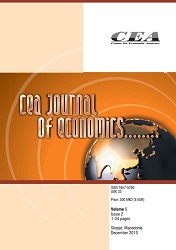SLOWDOWN, CREDIBILITY AND EU ANCHORING OF STRUCTURAL REFORMS IN THE WESTERN BALKANS
SLOWDOWN, CREDIBILITY AND EU ANCHORING OF STRUCTURAL REFORMS IN THE WESTERN BALKANS
Author(s): Fatmir BesimiSubject(s): National Economy, Supranational / Global Economy
Published by: Центарот за економски анализи (ЦЕА)
Keywords: Structural reforms; European integration; Political Economy; Credibility; Economic convergence
Summary/Abstract: The EU integration has been an important process of economic, political and social transformation of the Western Balkans and its convergence with the European Union. According to empirical evidence and the international reform indicators in the recent years the pace of structural reforms is slowed down in the Western Balkan countries and the catching-up after the global economic crisis is slower compared to the New Member States of the EU. The aim of this paper is to answer the question of how to accelerate economic growth and convergence with the EU by accelerating structural reforms and their credibility. The empirical analysis shows positive impact of structural reforms and EU integration on convergence with the EU. In order to draw recommendations for policy makers in this analysis, we develop a theoretical model for the political economy of structural reforms for the countries of the Western Balkans in the process of EU accession. The model suggests that in a dynamic world with rational expectations, the credibility of policymakers is crucial in accelerating reforms and joining the EU, especially given the temporal inconsistency and trade-off between short-term costs and long-term benefits as well as the redistributive effect of reforms in the society. We find that the EU can play a role in increasing the credibility and pace of reforms for countries in the Western Balkans through EU anchoring of reforms within policy rule framework or through the influence on the following policy channels within policy discretion framework: increasing the government’s reform preferences; reducing the government’s populism; reducing public’s short-termism (public’s reform sensitivity); increasing the credibility of the EU accession process; and reducing the government’s credibility gap. In addition, the empirical and theoretical analysis of this research as a recommendation to the European Commission indicates that when designing an EU enlargement strategy consideration should be given to the endogenous convergence, the political economy of structural reforms for EU integration, and the strengthening of the credibility of the process of the EU enlargement in the Western Balkans.
Journal: CEA Journal of Economics
- Issue Year: 13/2018
- Issue No: 2
- Page Range: 5-20
- Page Count: 16
- Language: English

